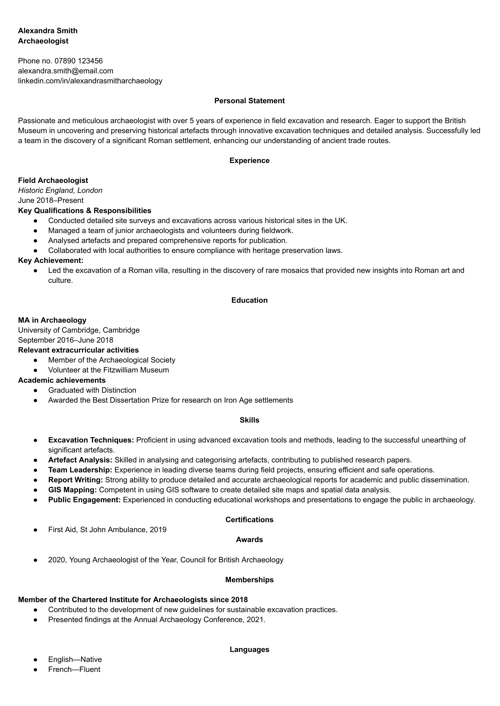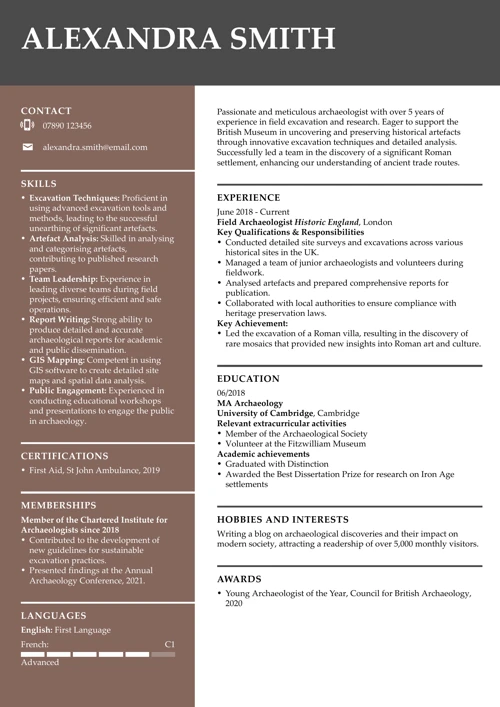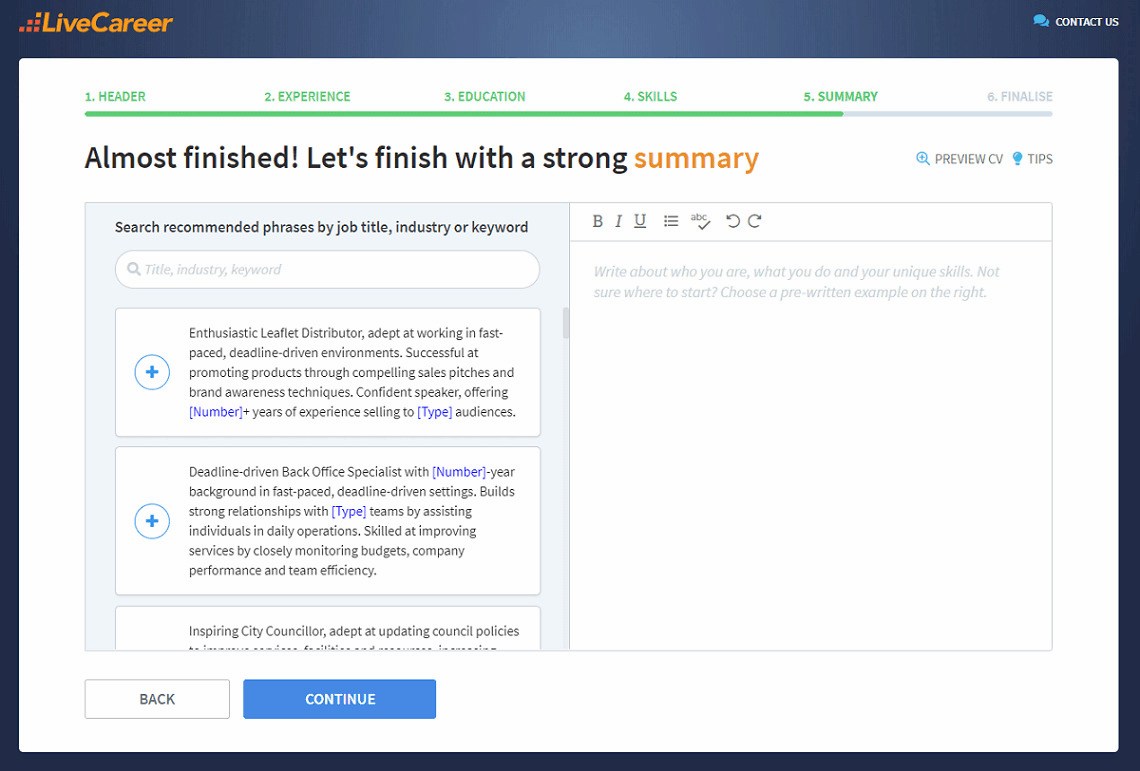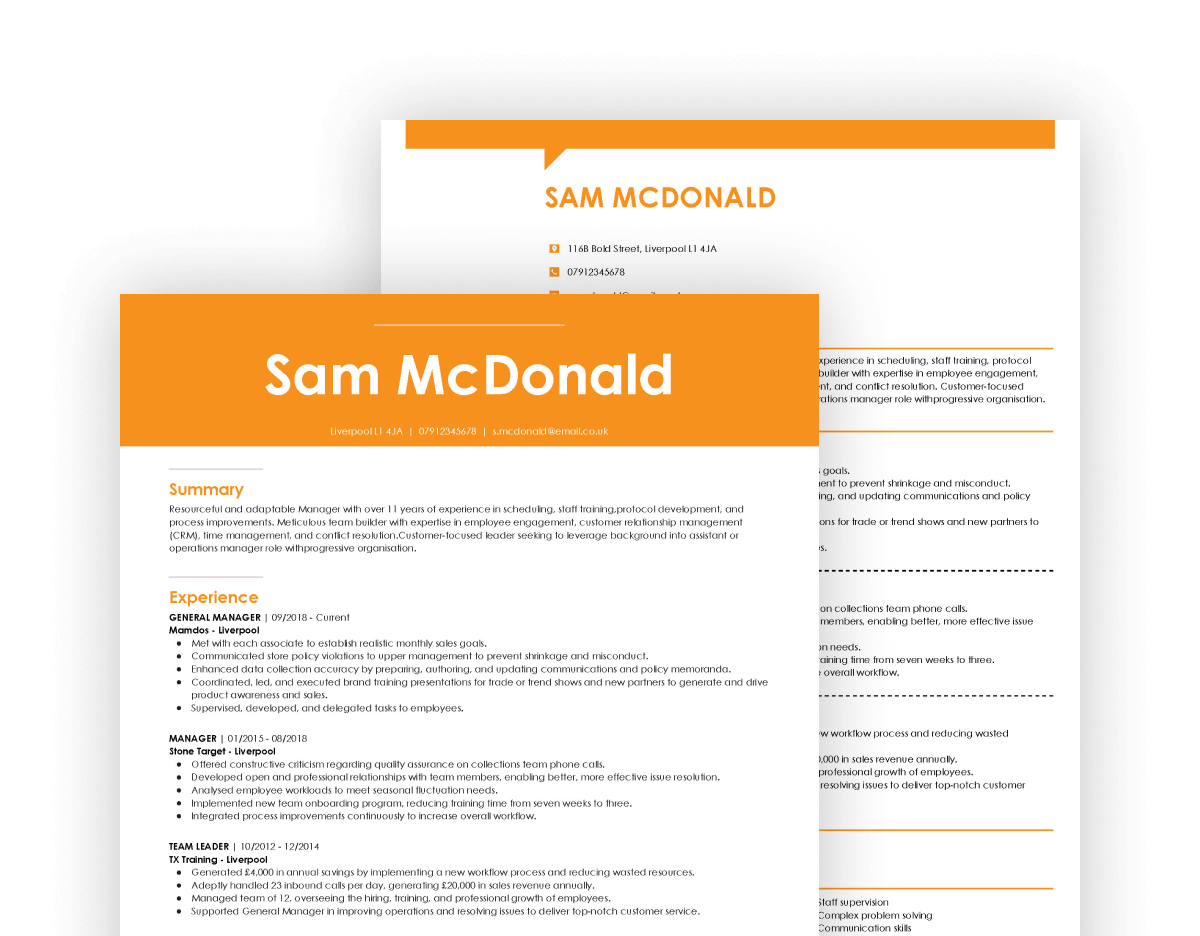Create a professional CV now!
 NO
NO YES
YESOur customers were hired by:
As an archaeologist, crafting a compelling CV is essential to showcasing your expertise and passion for uncovering the secrets of the past. Highlighting your qualifications, such as fieldwork experience, research skills, and knowledge of archaeological methodologies, can set you apart in this competitive field. Our expert advice on writing an archaeology CV will guide you in effectively presenting your skills and achievements, complete with tailored examples to enhance your application.
Create an effective CV in minutes. Choose a professional CV template and fill in every section of your CV in a flash using ready-made content and expert tips.
Create a professional CV now!
 NO
NO YES
YESWe created the sample on the right using our builder. See other good CV examples like this one.
Save a lot of time—just copy this archaeologist CV template and use our tips to adjust it to your needs:
Alexandra Smith
Archaeologist
Phone no. 07890 123456
alexandra.smith@email.com
linkedin.com/in/alexandrasmitharchaeology
Personal Statement
Passionate and meticulous archaeologist with over 5 years of experience in field excavation and research. Eager to support the British Museum in uncovering and preserving historical artefacts through innovative excavation techniques and detailed analysis. Successfully led a team in the discovery of a significant Roman settlement, enhancing our understanding of ancient trade routes.
Experience
Field Archaeologist
Historic England, London
June 2018–Present
Key Qualifications & Responsibilities
Key Achievement:
Education
MA in Archaeology
University of Cambridge, Cambridge
September 2016–June 2018
Relevant extracurricular activities
Academic achievements
Skills
Certifications
Awards
Memberships
Member of the Chartered Institute for Archaeologists since 2018
Languages
Interests
A well-crafted archaeologist CV can set you apart by demonstrating relevant experiences and skills. Starting with a compelling personal statement, this CV for archaeologist roles adopts a tailored strategy, demonstrating how your strengths can benefit the organisation. It also showcases a notable achievement in archaeology early on, even before delving into work history. By adopting this method, your archaeologist CV will distinguish itself, capturing the attention of hiring managers.
To excel in crafting an archaeologist CV, consider these five insightful tips tailored to the profession:
By following these suggestions, you'll craft an archaeologist CV that captures the interest of potential employers. If you're unfamiliar with CV writing, consider brushing up on the fundamentals of CV creation.
Here’s a quick writing guide to help you prepare an archaeologist CV:
In the competitive field of archaeology, your CV needs to stand out. Crafting a general CV that you can easily customise for each application is a smart strategy. Avoid a generic approach, as a personalised application is key to success.
The tips below will help you target your archaeologist CV to a specific role, so you can make as many variations of your application as you need:
The structure of your CV is crucial, much like the precise layers of an archaeological site. Ensure your CV is organised with sections in the following order: header, personal statement, work history, education, skills, and additional sections. Arrange your experiences in reverse chronological order. If you're crafting a CV without prior experience, consider swapping the order of education and work history.
Career experts recommend using simple CV templates that are favoured by recruiters and applicant tracking systems. Your archaeologist CV should prioritise clarity over fancy visuals, maintaining proper formatting. Set margins to 1 inch on all sides, with 1–1.15 line spacing to ensure readability. Opt for classic fonts like Times New Roman or Calibri, using font sizes of 11–12 for text and 13–14 for headings. Once your CV is complete, save it as a PDF, unless otherwise specified by the application system.
Your personal statement serves as a promotional tool, showcasing your suitability for the role you are targeting. A strong introduction to a CV for archaeologist positions effectively highlights your professional accomplishments and relevant expertise. Capture the attention of the hiring manager by aligning your personal statement with the job requirements, ensuring it reflects your unique strengths and experiences. Aim for a concise introduction of 3–4 sentences.
A strong CV summary will convince the recruiter you’re the perfect candidate. Save time and choose a ready-made personal statement written by career experts and adjust it to your needs in the LiveCareer CV builder.

In the field of archaeology, it is essential to show employers you can fulfil the role's responsibilities effectively. The work experience section of your CV should detail your capability in conducting excavations, analysing artefacts, and collaborating with multidisciplinary teams. Include 3–5 bullet points highlighting your competence in these areas, along with a key achievement that stands out. Each bullet point should begin with a compelling action verb for a CV to make a strong impact.
Even without direct archaeological roles, you may possess relevant experience from academic projects or volunteer work. Consider developing a skills-based CV to prioritise your pertinent skills at the forefront of your application.
We’ve prepared a list of exemplary professional achievements for an archaeologist CV to inspire you:
Professional duties & achievements for an archaeologist CV—examples
For those beginning their career in archaeology, your educational background can be a significant asset. Although entry-level roles may not always demand extensive academic credentials, possessing a degree in archaeology or a related field can significantly enhance your prospects for advancement. It's crucial to prioritise your most advanced qualifications first, listing them in reverse chronological order. Make sure the education section of your CV includes pertinent coursework and any extracurricular activities that demonstrate your abilities. Explore tips on writing your degree on a CV and consider showcasing extracurricular activities that highlight relevant skills.
There’s a good and a bad way to present skills on an archaeologist CV, much like the difference between a well-curated exhibition and a jumbled display. A less effective method involves simply listing skills without context or connection. Conversely, a superior approach involves customising your skills list to reflect the job description and adding descriptions that illustrate your professional mindset.
Core competencies for an archaeologist combine both soft skills and hard skills,such as communication, time management, critical thinking, field survey techniques, and proficiency in archaeological software. Carefully review the job posting to ensure you have highlighted all the skills relevant to the position you seek.
Additional CV sections aren’t just fillers, so use them wisely. They can serve as opportunities to demonstrate your qualifications for the role.
Your choice isn’t limited to professional certificates or licences. As an example, knowledge of foreign languages can be highly useful for participation in international archaeological projects. Plus, industry knowledge demonstrated in the hobbies and interests section can help your archaeology CV win additional points.
An application remains incomplete without a cover letter that provides deeper insights beyond the CV. Tailor your cover letter by articulating your sincere enthusiasm for the role. Begin with a personal introduction, segue into your skills and experiences, and end the letter by highlighting how your contributions would benefit the organisation. Suggest a follow-up meeting or call and conclude with a professional sign-off.
You don’t have to be a CV writing expert. In the LiveCareer CV builder you’ll find ready-made content for every industry and position, which you can then add with a single click.

Applying for other jobs? Try these CV examples as well:
In the journey of your archaeological career, every application is a step towards uncovering new opportunities. Thank you for reading, and feel free to leave any questions about creating an archaeologist CV in the comments below.
Our editorial team has reviewed this article for compliance with Livecareer’s editorial guidelines. It’s to ensure that our expert advice and recommendations are consistent across all our career guides and align with current CV and cover letter writing standards and trends. We’re trusted by over 10 million job seekers, supporting them on their way to finding their dream job. Each article is preceded by research and scrutiny to ensure our content responds to current market trends and demand.
About the author
Since 2013, the LiveCareer UK team has shared the best advice to help you advance your career. Experts from our UK editorial team have written more than one hundred guides on how to write the perfect CV or cover letter.
Rate this article:
Archaeologist cv
Average:


Writing your first-ever graduate CV? Check our comprehensive guide featuring a graduate CV example, template, expert tips, and tricks to make your CV stand out.
![Student CV: 5 CV Examples for Students [2025]](https://cdn-images.livecareer.co.uk/pages/student_cv_lc_uk_2.jpg?fit=crop&h=216&dpr=3)
Discover inspiring CV examples for students and land your dream opportunities. Build a great student CV template that sets you apart from the crowd.

Learn how to create a first-grade teaching assistant CV with expert CV examples, writing tips, and templates. Also for candidates with no experience.
Our customers were hired by: